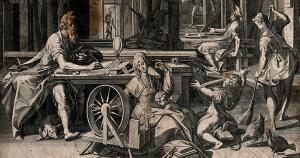 Acts 18:24-19:7
Acts 18:24-19:7
At the beginning of Acts 18, I talked about the importance of relationships in the Body of Christ and of how God comes to us. If, as I’ve been saying all along, the book of Acts is about the Spirit of Christ in the Body of Christ continuing to teach and do the things of Jesus Christ, then the relationships we have in the Body of Christ are extraordinarily, eternally important.
Today, I want to look at the end of Acts 18 to see more closely the dense web of relationships that the Holy Spirit creates in order to bring Jesus Christ to people. In a short space of time we find a number of interrelated relationships which exist not only in Acts 18 but also spill out over into previous chapters of Acts and into other books of the Bible.
When I read the Bible, I’m often filled with the sensation that I am not alone. Not only do I feel the presence of the Holy Spirit but I also feel the lives of those filled by the Spirit so many years ago. I feel connected to them. They live and move, and I feel it, and I think that as I live and move they feel me, because I believe in something known as the communion of saints, the holy Catholic church.
When I read a particular book of the Bible, I also feel the gravitational pull of other books. One verse that has been written on my heart tugs at another verse written on my heart; one verse etched into the sulci of my brain signals another verse etched into another area of my brain; organ unto organ utters speech, and verse unto verse reveals knowledge, and there is no place in the Bible or in the world or in my life where the voice of God does not reverberate.
At the end of Acts 18, we hear about Apollos, an eloquent man and mighty in the Scriptures. Someone must have instructed this Apollos in the Scriptures. We’ll never know who it was, but somebody was doing his job. But he did it imperfectly, because Apollos had to be instructed more accurately by Aquila and Priscilla. These two took Apollos aside and explained to him the way of God more accurately. They might have secretly wondered about Apollos or been shocked by his ignorance. But what they did was to take him aside, not embarrassing him publicly, and take it upon themselves to explain the Scriptures more accurately.
Now Aquila and Priscilla must first have heard the God more perfectly from someone. Who could this have been? We know that it was the apostle Paul, who most certainly did his job faithfully and well. And so we already have a line of influence and relationship from Paul to Aquila and Priscilla (forged by their common vocation of making tents) to Apollos (who was taught by some unknown teacher or teachers) to those in Ephesus who heard Apollos speak.
Then Apollos desired to cross to the region of Achaia, where Corinth would have been. The disciples or brethren in Ephesus then write to the disciples in Corinth so that they would receive Apollos. Why would the disciples in Corinth listen to Aquila and Priscilla in Corinth? Because they were from Corinth (remember all the way back to the beginning of Acts 18?) You see how important our relationships are in bringing the gospel to people!
Now the church of Corinth had been established by guess who? The apostle Paul, who had taken the trouble to spend 18 months there and had spent a lot of time with Priscilla and Aquila. Without this time and special relationship, the work of Apollos that we see in today’s lesson would be have been less accurate, less powerful, and less extensive (he probably wouldn’t have been received at Corinth).
Once Apollos got to Corinth, what do we find him doing? We find that he greatly helped those who had believed through grace. In other words, Apollos, partly discipled by Priscilla and Aquila, helps disciple the disciples in Corinth who the Spirit had first converted by Paul. Apollos’ influence in Corinth was so great that he became one of the leaders with a cult following there, right up with Paul and Cephas (see 1 Corinthians 1 and 3).
In the web of relationships that God creates in the Body of His Son, we must never forget what the Corinthians were slow to learn: neither he who plants is anything, nor he who waters, but God who gives the increase. He who plants and he who waters are one. We are not only God’s fellow workers but also His one building.
In my life, there is a dense web of godly relationships that God has used to make me the disciple I am (maybe I should insert a disclaimer here like the ones authors place in the front of scholarly works to the effect that here’s a list of people who have helped me a lot but whatever boo boos you see are ones I alone am accountable for!)
No one else could ever have had the degree of godly influence that my godly parents had. Whatever mistakes they might have made, however fallible they may be, they left me with an unshakeable affinity for God. So strong was my sense of God growing up that even though I didn’t feel Him in a dramatic and vibrant way like some do, He was the one given in life that never changed. What I was taught was reinforced by what I saw of my parents’ lives. I never analyzed it early on: it just was. And so God was communicated to me.
Supporting them was a cadre of Sunday school teachers, many whose names I’ve forgotten. One, whose name I’ll always remember, was my high school Sunday school teacher, Tom McGee. What I remember most was that he kept nagging my brother and I until we capitulated and joined his Bible study on the book of Philippians. His study was the first study of a book of the Bible that I undertook in such depth and to a large degree on my own.
When I got my first teaching job after college I ended up at a hip church in Humble, Texas near Houston. The pastor was George Grant, and under his leadership, I learned to more consistently and faithfully apply a biblical worldview to every area of my life. Reading intellectual Christian books and discussing them with a group of mostly young adults was one of the most delightfully cool experiences in my life. One of the funky fruits of this relationship was a movie my brother Paul and I made during our time at Believer’s Fellowship. (To see “I was a Teenage Pietistic Dandy,” go to: http://youtube.com/watch?v=YwRfh9Zy0CA [Part 1] and http://youtube.com/watch?v=FNbeyW9B8KQ&feature=related [Part 2.])
At Believer’s Fellowship I was exposed to elements of the historic liturgy, and eventually I made my way into the Reformed Episcopal Church. In fact, it was because many of the leaders of Believer’s Fellowship were connected to Good Shepherd Church in Tyler, Texas that I ended up there. One of my greatest influences there was Ray Sutton, now a bishop in the REC and a man who helped me understand the covenant better and to read the Bible in more creative ways. Also while at Good Shepherd REC, I learned a lot about diligence and leadership from Walter Banek, who was the headmaster of Good Shepherd but is now its rector.
In due time, God raised me up to be a leader as well, and who knows what stories people (especially my kids) will tell about me in the years to come!
In telling these things, my life seems a lot like that of Apollos and his own web of relationships. God comes to us through the holy relationships He brings our way. Therefore, take each of those relationships seriously: they are holy. They have been sanctified by the Blood of the Lamb, and they are a part of the Body of Christ on earth today. They are the way that Jesus Christ acts and speaks in people’s lives today.
Prayer: Father, I thank You that before the world was formed You chose me to be Your child. I thank You for all of the ways You have come to me in my life and pray that You would open my eyes to see You in each holy relationship You have come to me in. Help me to receive Your blessing from those who teach me and to impart Your blessing to those You have called me to teach, that in all of my relationships Your Body may be edified and Your name glorified. Amen.
Point for Meditation: Reflect on the web of holy relationships in your life. What people has God used in your life? What relationships of yours does He desire to bless by His presence? Who might He be asking you to teach or lead?
Resolution: I resolve to find one way to be the presence of Christ in one person’s life today.
Paul in the House of Priscilla and Aquila – Creative Commons Attribution-Share Alike 4.0 International license












